

Concept Papers in Research: Deciphering the blueprint of brilliance
Concept papers hold significant importance as a precursor to a full-fledged research proposal in academia and research. Understanding the nuances and significance of a concept paper is essential for any researcher aiming to lay a strong foundation for their investigation.
Table of Contents
What Is Concept Paper
A concept paper can be defined as a concise document which outlines the fundamental aspects of a grant proposal. It outlines the initial ideas, objectives, and theoretical framework of a proposed research project. It is usually two to three-page long overview of the proposal. However, they differ from both research proposal and original research paper in lacking a detailed plan and methodology for a specific study as in research proposal provides and exclusion of the findings and analysis of a completed research project as in an original research paper. A concept paper primarily focuses on introducing the basic idea, intended research question, and the framework that will guide the research.
Purpose of a Concept Paper
A concept paper serves as an initial document, commonly required by private organizations before a formal proposal submission. It offers a preliminary overview of a project or research’s purpose, method, and implementation. It acts as a roadmap, providing clarity and coherence in research direction. Additionally, it also acts as a tool for receiving informal input. The paper is used for internal decision-making, seeking approval from the board, and securing commitment from partners. It promotes cohesive communication and serves as a professional and respectful tool in collaboration.
These papers aid in focusing on the core objectives, theoretical underpinnings, and potential methodology of the research, enabling researchers to gain initial feedback and refine their ideas before delving into detailed research.
Key Elements of a Concept Paper
Key elements of a concept paper include the title page , background , literature review , problem statement , methodology, timeline, and references. It’s crucial for researchers seeking grants as it helps evaluators assess the relevance and feasibility of the proposed research.
Writing an effective concept paper in academic research involves understanding and incorporating essential elements:
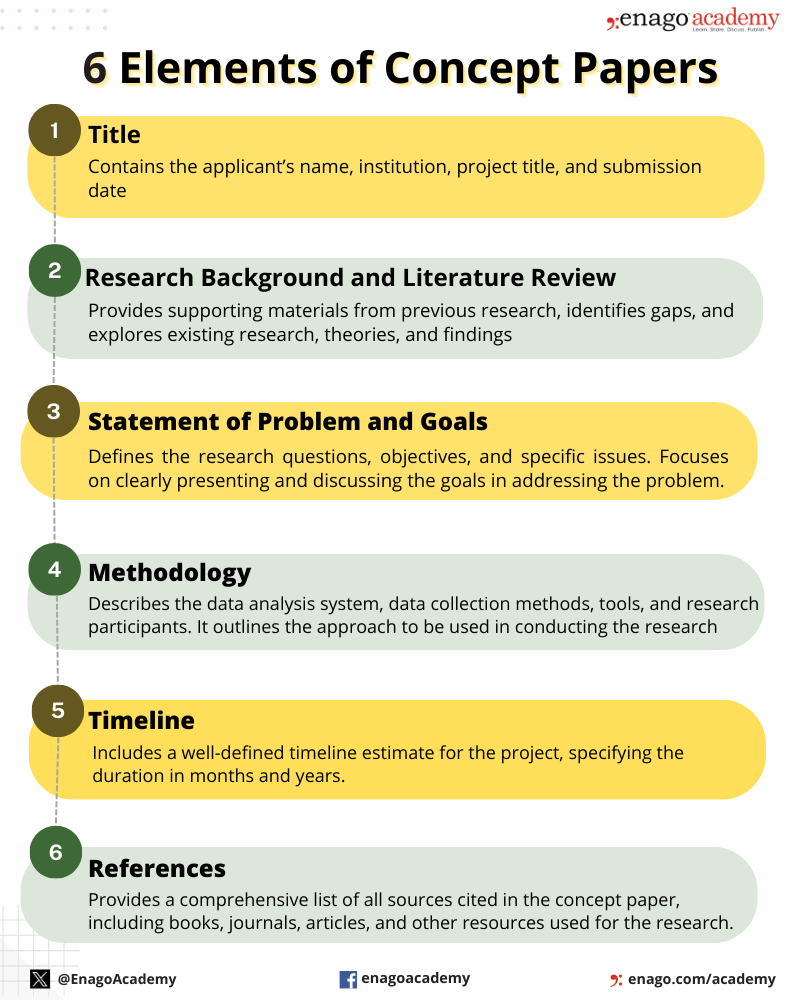
How to Write a Concept Paper?
To ensure an effective concept paper, it’s recommended to select a compelling research topic, pose numerous research questions and incorporate data and numbers to support the project’s rationale. The document must be concise (around five pages) after tailoring the content and following the formatting requirements. Additionally, infographics and scientific illustrations can enhance the document’s impact and engagement with the audience. The steps to write a concept paper are as follows:
1. Write a Crisp Title:
Choose a clear, descriptive title that encapsulates the main idea. The title should express the paper’s content. It should serve as a preview for the reader.
2. Provide a Background Information:
Give a background information about the issue or topic. Define the key terminologies or concepts. Review existing literature to identify the gaps your concept paper aims to fill.
3. Outline Contents in the Introduction:
Introduce the concept paper with a brief overview of the problem or idea you’re addressing. Explain its significance. Identify the specific knowledge gaps your research aims to address and mention any contradictory theories related to your research question.
4. Define a Mission Statement:
The mission statement follows a clear problem statement that defines the problem or concept that need to be addressed. Write a concise mission statement that engages your research purpose and explains why gaining the reader’s approval will benefit your field.
5. Explain the Research Aim and Objectives:
Explain why your research is important and the specific questions you aim to answer through your research. State the specific goals and objectives your concept intends to achieve. Provide a detailed explanation of your concept. What is it, how does it work, and what makes it unique?
6. Detail the Methodology:
Discuss the research methods you plan to use, such as surveys, experiments, case studies, interviews, and observations. Mention any ethical concerns related to your research.
7. Outline Proposed Methods and Potential Impact:
Provide detailed information on how you will conduct your research, including any specialized equipment or collaborations. Discuss the expected results or impacts of implementing the concept. Highlight the potential benefits, whether social, economic, or otherwise.
8. Mention the Feasibility
Discuss the resources necessary for the concept’s execution. Mention the expected duration of the research and specific milestones. Outline a proposed timeline for implementing the concept.
9. Include a Support Section:
Include a section that breaks down the project’s budget, explaining the overall cost and individual expenses to demonstrate how the allocated funds will be used.
10. Provide a Conclusion:
Summarize the key points and restate the importance of the concept. If necessary, include a call to action or next steps.
Although the structure and elements of a concept paper may vary depending on the specific requirements, you can tailor your document based on the guidelines or instructions you’ve been given.
Here are some tips to write a concept paper:
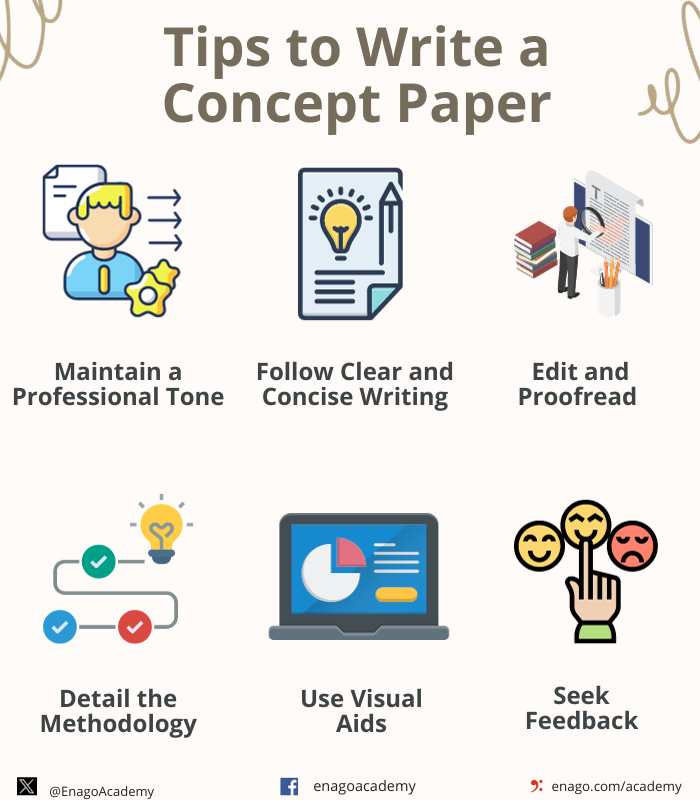
Example of a Concept Paper
Here is an example of a concept paper. Please note, this is a generalized example. Your concept paper should align with the specific requirements, guidelines, and objectives you aim to achieve in your proposal. Tailor it accordingly to the needs and context of the initiative you are proposing.
Download Now!
Importance of a Concept Paper
Concept papers serve various fields, influencing the direction and potential of research in science, social sciences, technology, and more. They contribute to the formulation of groundbreaking studies and novel ideas that can impact societal, economic, and academic spheres.
A concept paper serves several crucial purposes in various fields:
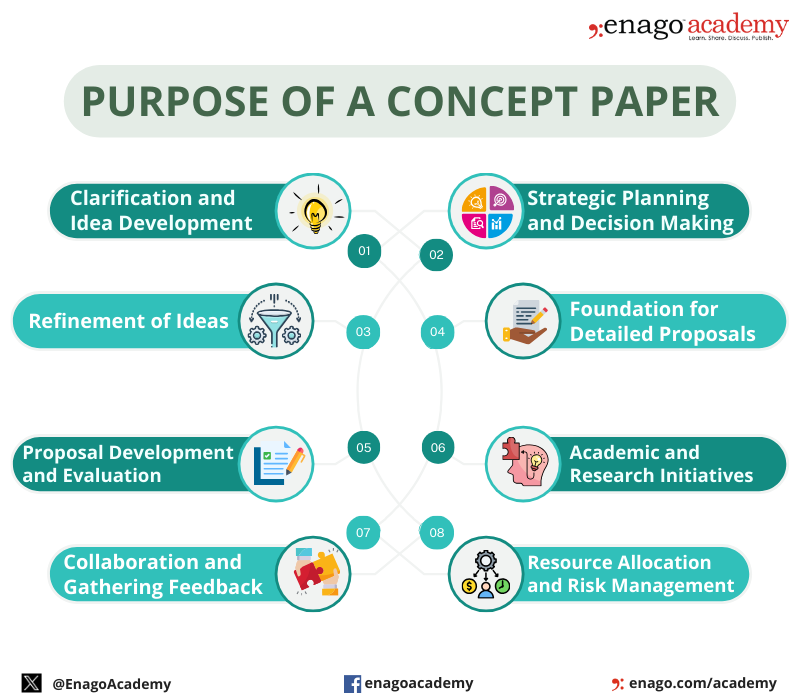
In summary, a well-crafted concept paper is essential in outlining a clear, concise, and structured framework for new ideas or proposals. It helps in assessing the feasibility, viability, and potential impact of the concept before investing significant resources into its implementation.
How well do you understand concept papers? Test your understanding now!
Fill the Details to Check Your Score

Role of AI in Writing Concept Papers
The increasing use of AI, particularly generative models, has facilitated the writing process for concept papers. Responsible use involves leveraging AI to assist in ideation, organization, and language refinement while ensuring that the originality and ethical standards of research are maintained.
AI plays a significant role in aiding the creation and development of concept papers in several ways:
1. Idea Generation and Organization
AI tools can assist in brainstorming initial ideas for concept papers based on key concepts. They can help in organizing information, creating outlines, and structuring the content effectively.
2. Summarizing Research and Data Analysis
AI-powered tools can assist in conducting comprehensive literature reviews, helping writers to gather and synthesize relevant information. AI algorithms can process and analyze vast amounts of data, providing insights and statistics to support the concept presented in the paper.
3. Language and Style Enhancement
AI grammar checker tools can help writers by offering grammar, style, and tone suggestions, ensuring professionalism. It can also facilitate translation, in case a global collaboration.
4. Collaboration and Feedback
AI platforms offer collaborative features that enable multiple authors to work simultaneously on a concept paper, allowing for real-time contributions and edits.
5. Customization and Personalization
AI algorithms can provide personalized recommendations based on the specific requirements or context of the concept paper. They can assist in tailoring the concept paper according to the target audience or specific guidelines.
6. Automation and Efficiency
AI can automate certain tasks, such as citation formatting, bibliography creation, or reference checking, saving time for the writer.
7. Analytics and Prediction
AI models can predict potential outcomes or impacts based on the information provided, helping writers anticipate the possible consequences of the proposed concept.
8. Real-Time Assistance
AI-driven chat-bots can provide real-time support and answers to specific questions related to the concept paper writing process.
AI’s role in writing concept papers significantly streamlines the writing process, enhances the quality of the content, and provides valuable assistance in various stages of development, contributing to the overall effectiveness of the final document.
Concept papers serve as the stepping stone in the research journey, aiding in the crystallization of ideas and the formulation of robust research proposals. It the cornerstone for translating ideas into impactful realities. Their significance spans diverse domains, from academia to business, enabling stakeholders to evaluate, invest, and realize the potential of groundbreaking concepts.
Frequently Asked Questions
A concept paper can be defined as a concise document outlining the fundamental aspects of a grant proposal such as the initial ideas, objectives, and theoretical framework of a proposed research project.
A good concept paper should offer a clear and comprehensive overview of the proposed research. It should demonstrate a strong understanding of the subject matter and outline a structured plan for its execution.
Concept paper is important to develop and clarify ideas, develop and evaluate proposal, inviting collaboration and collecting feedback, presenting proposals for academic and research initiatives and allocating resources.
I got wonderful idea
It helps a lot for my concept paper.
Rate this article Cancel Reply
Your email address will not be published.

Enago Academy's Most Popular Articles

- Diversity and Inclusion
Need for Diversifying Academic Curricula: Embracing missing voices and marginalized perspectives
In classrooms worldwide, a single narrative often dominates, leaving many students feeling lost. These stories,…

- Career Corner
- Trending Now
Recognizing the signs: A guide to overcoming academic burnout
As the sun set over the campus, casting long shadows through the library windows, Alex…

Reassessing the Lab Environment to Create an Equitable and Inclusive Space
The pursuit of scientific discovery has long been fueled by diverse minds and perspectives. Yet…

- AI in Academia
Simplifying the Literature Review Journey — A comparative analysis of 6 AI summarization tools
Imagine having to skim through and read mountains of research papers and books, only to…

- Reporting Research
How to Improve Lab Report Writing: Best practices to follow with and without AI-assistance
Imagine you’re a scientist who just made a ground-breaking discovery! You want to share your…

Sign-up to read more
Subscribe for free to get unrestricted access to all our resources on research writing and academic publishing including:
- 2000+ blog articles
- 50+ Webinars
- 10+ Expert podcasts
- 50+ Infographics
- 10+ Checklists
- Research Guides
We hate spam too. We promise to protect your privacy and never spam you.
I am looking for Editing/ Proofreading services for my manuscript Tentative date of next journal submission:

As a researcher, what do you consider most when choosing an image manipulation detector?

Community Blog
Keep up-to-date on postgraduate related issues with our quick reads written by students, postdocs, professors and industry leaders.
What is a Concept Paper and How do You Write One?
- By DiscoverPhDs
- August 26, 2020

What is a Concept Paper?
A concept paper is a short document written by a researcher before starting their research project, with the purpose of explaining what the study is about, why it is important and the methods that will be used.
The concept paper will include your proposed research title, a brief introduction to the subject, the aim of the study, the research questions you intend to answer, the type of data you will collect and how you will collect it. A concept paper can also be referred to as a research proposal.
What is the Purpose of a Concept Paper?
The primary aim of a research concept paper is to convince the reader that the proposed research project is worth doing. This means that the reader should first agree that the research study is novel and interesting. They should be convinced that there is a need for this research and that the research aims and questions are appropriate.
Finally, they should be satisfied that the methods for data collection proposed are feasible, are likely to work and can be performed within the specific time period allocated for this project.
The three main scenarios in which you may need to write a concept paper are if you are:
- A final year undergraduate or master’s student preparing to start a research project with a supervisor.
- A student submitting a research proposal to pursue a PhD project under the supervision of a professor.
- A principal investigator submitting a proposal to a funding body to secure financial support for a research project.
How Long is a Concept Paper?
The concept paper format is usually between 2 and 3 pages in length for students writing proposals for undergraduate, master’s or PhD projects. Concept papers written as part of funding applications may be over 20 pages in length.
How do you Write a Concept Paper?
There are 6 important aspects to consider when writing a concept paper or research proposal:
- 1. The wording of the title page, which is best presented as a question for this type of document. At this study concept stage, you can write the title a bit catchier, for example “Are 3D Printed Engine Parts Safe for Use in Aircraft?”.
- A brief introduction and review of relevant existing literature published within the subject area and identification of where the gaps in knowledge are. This last bit is particularly important as it guides you in defining the statement of the problem. The concept paper should provide a succinct summary of ‘the problem’, which is usually related to what is unknown or poorly understood about your research topic . By the end of the concept paper, the reader should be clear on how your research idea will provide a ‘solution’ to this problem.
- The overarching research aim of your proposed study and the objectives and/or questions you will address to achieve this aim. Align all of these with the problem statement; i.e. write each research question as a clear response to addressing the limitations and gaps identified from previous literature. Also give a clear description of your primary hypothesis.
- The specific data outputs that you plan to capture. For example, will this be qualitative or quantitative data? Do you plan to capture data at specific time points or at other defined intervals? Do you need to repeat data capture to asses any repeatability and reproducibility questions?
- The research methodology you will use to capture this data, including any specific measurement or analysis equipment and software you will use, and a consideration of statistical tests to help interpret the data. If your research requires the use of questionnaires, how will these be prepared and validated? In what sort of time frame would you plan to collect this data?
- Finally, include a statement of the significance of the study , explaining why your research is important and impactful. This can be in the form of a concluding paragraph that reiterate the statement of the problem, clarifies how your research will address this and explains who will benefit from your research and how.
You may need to include a short summary of the timeline for completing the research project. Defining milestones of the time points at which you intend to complete certain tasks can help to show that you’ve considered the practicalities of running this study. It also shows that what you have proposed is feasible in order to achieve your research goal.
If you’re pitching your proposed project to a funder, they may allocate a proportion of the money based on the satisfactory outcome of each milestone. These stakeholders may also be motivated by knowing that you intend to convert your dissertation into an article for journal publication; this level of dissemination is of high importance to them.
Additionally, you may be asked to provide a brief summary of the projected costs of running the study. For a PhD project this could be the bench fees associated with consumables and the cost of any travel if required.
Make sure to include references and cite all other literature and previous research that you discuss in your concept paper.
This guide gave you an overview of the key elements you need to know about when writing concept papers. The purpose of these are first to convey to the reader what your project’s purpose is and why your research topic is important; this is based on the development of a problem statement using evidence from your literature review.
Explain how it may positively impact your research field and if your proposed research design is appropriate and your planned research method achievable.

Learn 10 ways to impress a PhD supervisor for increasing your chances of securing a project, developing a great working relationship and more.

A concept paper is a short document written by a researcher before starting their research project, explaining what the study is about, why it is needed and the methods that will be used.

The term research instrument refers to any tool that you may use to collect, measure and analyse research data.
Join thousands of other students and stay up to date with the latest PhD programmes, funding opportunities and advice.

Browse PhDs Now

Thinking about applying to a PhD? Then don’t miss out on these 4 tips on how to best prepare your application.

Learn about defining your workspace, having a list of daily tasks and using technology to stay connected, all whilst working from home as a research student.

Calvin is coming to the end of the second year of his PhD at Trinity College Dublin, Ireland. His research is focussed on how recovery as a concept is socially constructed in mental health services.

Dr Pattison gained his PhD in Cosmology from the University of Portsmouth. He is now finishing a short term post-doc within the same research group and developing a career in science communication and science education.
Join Thousands of Students
What exactly is a Concept Paper, and how do you write one?
Learn why a concept paper is important, what the main elements of a research concept paper are, and how to create an excellent one.
Prior to submitting a formal proposal (business proposal, product, or research proposal), many private organizations have historically asked for the submission of a concept paper for review.
Recently, organizations have begun to advocate for the usage of concept papers as a way for applicants to obtain informal input on their ideas and projects before submitting a proposal. Several of these organizations now demand a concept paper as part of the official application process.
Simply described, a concept paper is a preliminary document that explains the purpose of research, why it is being conducted, and how it will be performed. It examines a concept or idea and offers an outline of the topic that a researcher wants to pursue. Continue reading to learn more about concept papers and how to create a good one.
What a concept paper is and its purpose
A concept paper is a brief paper that outlines the important components of a research or project before it is carried out. Its purpose is to offer an overview. Entrepreneurs working on a business idea or product, as well as students and researchers, frequently write concept papers .
Researchers may be required to prepare a concept paper when submitting a project proposal to a funding authority to acquire the required grants.
As a consequence, the importance is based on the fact that it should help the examiner determine whether the research is relevant, practicable, and useful .
If not, they may suggest looking into a different research area. It also allows the examiner to assess your comprehension of the research and, as a result, if you are likely to require assistance in completing the research.
Illustrate your Concept Paper with infographics
Infographics are very useful to explain complex subjects in a very short time. Use Mind the Graph to create beautiful infographics for your Concept Paper with scientifically accurate illustrations, icons, arrows and many other design tools.
Concept paper’s elements for an academic research
To produce an effective concept paper, you must first comprehend the essential elements of academic research:
- Title page: Mention the applicant’s name, institution, project title, and submission date.
- Background for the research: The second section should be the purpose section, which should be able to clear out what has already been stated about the subject, any gaps in information that need to be filled or problems to be solved, as well as the reason why you wish to examine the issue.
- Literature review: In this section, you should provide a theoretical basis and supporting material for your chosen subject.
- State the problem and your goals: Describe the overall problems, including the research questions and objectives. State your research’s unique and original aspects, concentrate on providing and clearly discussing your goals towards the problem.
- Methodology: Provide the data analysis system to be utilized, data collecting method, tools to be used, and research participants in this section.
- Timeline: Include a realistic timeline estimate that is defined in months and years.
- References: Add a list of all sources cited in your concept paper , such as books, journals, and other resources.
Tips on writing an effective concept paper
A concept paper is extremely crucial for a project or research, especially if it requires funding. Check out these simple tips to ensure your concept paper is successful and simple.
- Choose a research topic that truly piques your curiosity
- Create a list of research questions. The more, the merrier.
- When describing the project’s reasoning, use data and numbers.
- Use no more than 5 single-spaced pages.
- Tailor your speech to the appropriate audience.
- Make certain that the basic format elements, such as page numbers, are included.
- Spend additional time on your timeline as this section is critical for funding.
- Give specific examples of how you plan to measure your progress toward your goals.
- Provide an initial budget when seeking funds. Sponsors will want to obtain an idea of how much funds are required.
Start creating infographics and scientific illustrations
Use the power of infographics and scientific illustrations to your advantage. Including graphic assets in your work may increase your authority and highlight all of the most valuable information, ensuring that your audience is engaged and completely comprehensive of the information you are providing.
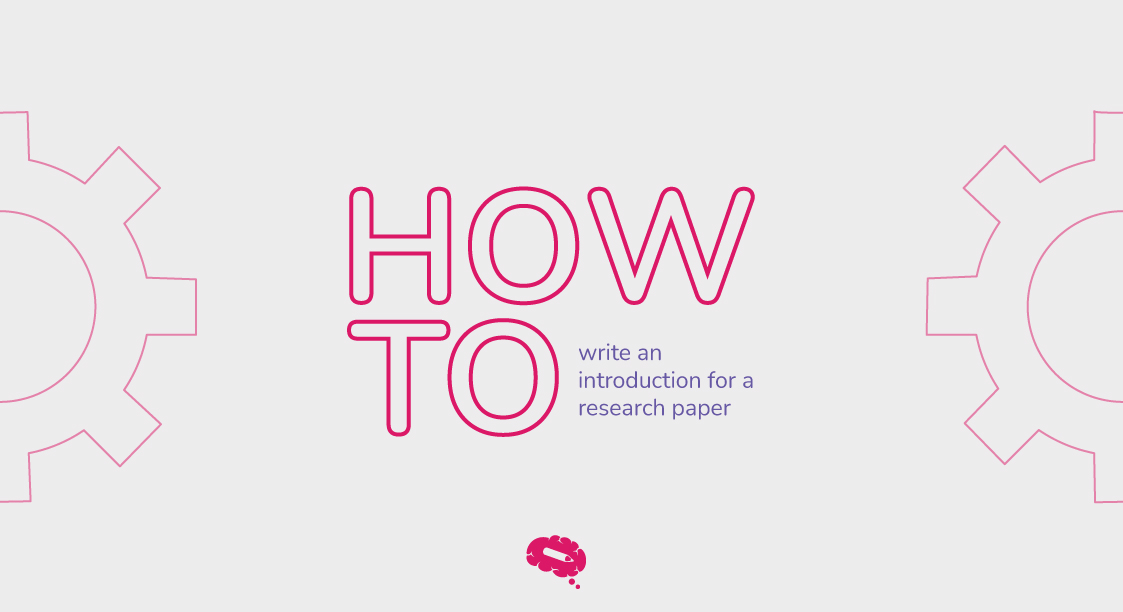
Subscribe to our newsletter
Exclusive high quality content about effective visual communication in science.
Unlock Your Creativity
Create infographics, presentations and other scientifically-accurate designs without hassle — absolutely free for 7 days!
About Jessica Abbadia
Jessica Abbadia is a lawyer that has been working in Digital Marketing since 2020, improving organic performance for apps and websites in various regions through ASO and SEO. Currently developing scientific and intellectual knowledge for the community's benefit. Jessica is an animal rights activist who enjoys reading and drinking strong coffee.
Content tags
Research Question 101 📖
Everything you need to know to write a high-quality research question
By: Derek Jansen (MBA) | Reviewed By: Dr. Eunice Rautenbach | October 2023
If you’ve landed on this page, you’re probably asking yourself, “ What is a research question? ”. Well, you’ve come to the right place. In this post, we’ll explain what a research question is , how it’s differen t from a research aim, and how to craft a high-quality research question that sets you up for success.
Research Question 101
What is a research question.
- Research questions vs research aims
- The 4 types of research questions
- How to write a research question
- Frequently asked questions
- Examples of research questions
As the name suggests, the research question is the core question (or set of questions) that your study will (attempt to) answer .
In many ways, a research question is akin to a target in archery . Without a clear target, you won’t know where to concentrate your efforts and focus. Essentially, your research question acts as the guiding light throughout your project and informs every choice you make along the way.
Let’s look at some examples:
What impact does social media usage have on the mental health of teenagers in New York?
How does the introduction of a minimum wage affect employment levels in small businesses in outer London?
How does the portrayal of women in 19th-century American literature reflect the societal attitudes of the time?
What are the long-term effects of intermittent fasting on heart health in adults?
As you can see in these examples, research questions are clear, specific questions that can be feasibly answered within a study. These are important attributes and we’ll discuss each of them in more detail a little later . If you’d like to see more examples of research questions, you can find our RQ mega-list here .

Research Questions vs Research Aims
At this point, you might be asking yourself, “ How is a research question different from a research aim? ”. Within any given study, the research aim and research question (or questions) are tightly intertwined , but they are separate things . Let’s unpack that a little.
A research aim is typically broader in nature and outlines what you hope to achieve with your research. It doesn’t ask a specific question but rather gives a summary of what you intend to explore.
The research question, on the other hand, is much more focused . It’s the specific query you’re setting out to answer. It narrows down the research aim into a detailed, researchable question that will guide your study’s methods and analysis.
Let’s look at an example:
Research Aim: To explore the effects of climate change on marine life in Southern Africa.
Research Question: How does ocean acidification caused by climate change affect the reproduction rates of coral reefs?
As you can see, the research aim gives you a general focus , while the research question details exactly what you want to find out.
Need a helping hand?
Types of research questions
Now that we’ve defined what a research question is, let’s look at the different types of research questions that you might come across. Broadly speaking, there are (at least) four different types of research questions – descriptive , comparative , relational , and explanatory .
Descriptive questions ask what is happening. In other words, they seek to describe a phenomena or situation . An example of a descriptive research question could be something like “What types of exercise do high-performing UK executives engage in?”. This would likely be a bit too basic to form an interesting study, but as you can see, the research question is just focused on the what – in other words, it just describes the situation.
Comparative research questions , on the other hand, look to understand the way in which two or more things differ , or how they’re similar. An example of a comparative research question might be something like “How do exercise preferences vary between middle-aged men across three American cities?”. As you can see, this question seeks to compare the differences (or similarities) in behaviour between different groups.
Next up, we’ve got exploratory research questions , which ask why or how is something happening. While the other types of questions we looked at focused on the what, exploratory research questions are interested in the why and how . As an example, an exploratory research question might ask something like “Why have bee populations declined in Germany over the last 5 years?”. As you can, this question is aimed squarely at the why, rather than the what.
Last but not least, we have relational research questions . As the name suggests, these types of research questions seek to explore the relationships between variables . Here, an example could be something like “What is the relationship between X and Y” or “Does A have an impact on B”. As you can see, these types of research questions are interested in understanding how constructs or variables are connected , and perhaps, whether one thing causes another.
Of course, depending on how fine-grained you want to get, you can argue that there are many more types of research questions , but these four categories give you a broad idea of the different flavours that exist out there. It’s also worth pointing out that a research question doesn’t need to fit perfectly into one category – in many cases, a research question might overlap into more than just one category and that’s okay.
The key takeaway here is that research questions can take many different forms , and it’s useful to understand the nature of your research question so that you can align your research methodology accordingly.

How To Write A Research Question
As we alluded earlier, a well-crafted research question needs to possess very specific attributes, including focus , clarity and feasibility . But that’s not all – a rock-solid research question also needs to be rooted and aligned . Let’s look at each of these.
A strong research question typically has a single focus. So, don’t try to cram multiple questions into one research question; rather split them up into separate questions (or even subquestions), each with their own specific focus. As a rule of thumb, narrow beats broad when it comes to research questions.
Clear and specific
A good research question is clear and specific, not vague and broad. State clearly exactly what you want to find out so that any reader can quickly understand what you’re looking to achieve with your study. Along the same vein, try to avoid using bulky language and jargon – aim for clarity.
Unfortunately, even a super tantalising and thought-provoking research question has little value if you cannot feasibly answer it. So, think about the methodological implications of your research question while you’re crafting it. Most importantly, make sure that you know exactly what data you’ll need (primary or secondary) and how you’ll analyse that data.
A good research question (and a research topic, more broadly) should be rooted in a clear research gap and research problem . Without a well-defined research gap, you risk wasting your effort pursuing a question that’s already been adequately answered (and agreed upon) by the research community. A well-argued research gap lays at the heart of a valuable study, so make sure you have your gap clearly articulated and that your research question directly links to it.
As we mentioned earlier, your research aim and research question are (or at least, should be) tightly linked. So, make sure that your research question (or set of questions) aligns with your research aim . If not, you’ll need to revise one of the two to achieve this.
FAQ: Research Questions
Research question faqs, how many research questions should i have, what should i avoid when writing a research question, can a research question be a statement.
Typically, a research question is phrased as a question, not a statement. A question clearly indicates what you’re setting out to discover.
Can a research question be too broad or too narrow?
Yes. A question that’s too broad makes your research unfocused, while a question that’s too narrow limits the scope of your study.
Here’s an example of a research question that’s too broad:
“Why is mental health important?”
Conversely, here’s an example of a research question that’s likely too narrow:
“What is the impact of sleep deprivation on the exam scores of 19-year-old males in London studying maths at The Open University?”
Can I change my research question during the research process?
How do i know if my research question is good.
A good research question is focused, specific, practical, rooted in a research gap, and aligned with the research aim. If your question meets these criteria, it’s likely a strong question.
Is a research question similar to a hypothesis?
Not quite. A hypothesis is a testable statement that predicts an outcome, while a research question is a query that you’re trying to answer through your study. Naturally, there can be linkages between a study’s research questions and hypothesis, but they serve different functions.
How are research questions and research objectives related?
The research question is a focused and specific query that your study aims to answer. It’s the central issue you’re investigating. The research objective, on the other hand, outlines the steps you’ll take to answer your research question. Research objectives are often more action-oriented and can be broken down into smaller tasks that guide your research process. In a sense, they’re something of a roadmap that helps you answer your research question.
Need some inspiration?
If you’d like to see more examples of research questions, check out our research question mega list here . Alternatively, if you’d like 1-on-1 help developing a high-quality research question, consider our private coaching service .

Psst... there’s more!
This post was based on one of our popular Research Bootcamps . If you're working on a research project, you'll definitely want to check this out ...
You Might Also Like:

Submit a Comment Cancel reply
Your email address will not be published. Required fields are marked *
Save my name, email, and website in this browser for the next time I comment.
- Print Friendly
- Resources Home 🏠
- Try SciSpace Copilot
- Search research papers
- Add Copilot Extension
- Try AI Detector
- Try Paraphraser
- Try Citation Generator
- April Papers
- June Papers
- July Papers

How To Write a Research Question

Academic writing and research require a distinct focus and direction. A well-designed research question gives purpose and clarity to your research. In addition, it helps your readers understand the issue you are trying to address and explore.
Every time you want to know more about a subject, you will pose a question. The same idea is used in research as well. You must pose a question in order to effectively address a research problem. That's why the research question is an integral part of the research process. Additionally, it offers the author writing and reading guidelines, be it qualitative research or quantitative research.
In your research paper , you must single out just one issue or problem. The specific issue or claim you wish to address should be included in your thesis statement in order to clarify your main argument.
A good research question must have the following characteristics.

- Should include only one problem in the research question
- Should be able to find the answer using primary data and secondary data sources
- Should be possible to resolve within the given time and other constraints
- Detailed and in-depth results should be achievable
- Should be relevant and realistic.
- It should relate to your chosen area of research
While a larger project, like a thesis, might have several research questions to address, each one should be directed at your main area of study. Of course, you can use different research designs and research methods (qualitative research or quantitative research) to address various research questions. However, they must all be pertinent to the study's objectives.

What is a Research Question?

A research question is an inquiry that the research attempts to answer. It is the heart of the systematic investigation. Research questions are the most important step in any research project. In essence, it initiates the research project and establishes the pace for the specific research A research question is:
- Clear : It provides enough detail that the audience understands its purpose without any additional explanation.
- Focused : It is so specific that it can be addressed within the time constraints of the writing task.
- Succinct: It is written in the shortest possible words.
- Complex : It is not possible to answer it with a "yes" or "no", but requires analysis and synthesis of ideas before somebody can create a solution.
- Argumental : Its potential answers are open for debate rather than accepted facts.
A good research question usually focuses on the research and determines the research design, methodology, and hypothesis. It guides all phases of inquiry, data collection, analysis, and reporting. You should gather valuable information by asking the right questions.
Why are Research Questions so important?
Regardless of whether it is a qualitative research or quantitative research project, research questions provide writers and their audience with a way to navigate the writing and research process. Writers can avoid "all-about" papers by asking straightforward and specific research questions that help them focus on their research and support a specific thesis.
Types of Research Questions

There are two types of research: Qualitative research and Quantitative research . There must be research questions for every type of research. Your research question will be based on the type of research you want to conduct and the type of data collection.
The first step in designing research involves identifying a gap and creating a focused research question.
Below is a list of common research questions that can be used in a dissertation. Keep in mind that these are merely illustrations of typical research questions used in dissertation projects. The real research questions themselves might be more difficult.
Example Research Questions

The following are a few examples of research questions and research problems to help you understand how research questions can be created for a particular research problem.
Steps to Write Research Questions

You can focus on the issue or research gaps you're attempting to solve by using the research questions as a direction.
If you're unsure how to go about writing a good research question, these are the steps to follow in the process:
- Select an interesting topic Always choose a topic that interests you. Because if your curiosity isn’t aroused by a subject, you’ll have a hard time conducting research around it. Alos, it’s better that you pick something that’s neither too narrow or too broad.
- Do preliminary research on the topic Search for relevant literature to gauge what problems have already been tackled by scholars. You can do that conveniently through repositories like Scispace , where you’ll find millions of papers in one place. Once you do find the papers you’re looking for, try our reading assistant, SciSpace Copilot to get simple explanations for the paper . You’ll be able to quickly understand the abstract, find the key takeaways, and the main arguments presented in the paper. This will give you a more contextual understanding of your subject and you’ll have an easier time identifying knowledge gaps in your discipline.
Also: ChatPDF vs. SciSpace Copilot: Unveiling the best tool for your research
- Consider your audience It is essential to understand your audience to develop focused research questions for essays or dissertations. When narrowing down your topic, you can identify aspects that might interest your audience.
- Ask questions Asking questions will give you a deeper understanding of the topic. Evaluate your question through the What, Why, When, How, and other open-ended questions assessment.
- Assess your question Once you have created a research question, assess its effectiveness to determine if it is useful for the purpose. Refine and revise the dissertation research question multiple times.
Additionally, use this list of questions as a guide when formulating your research question.
Are you able to answer a specific research question? After identifying a gap in research, it would be helpful to formulate the research question. And this will allow the research to solve a part of the problem. Is your research question clear and centered on the main topic? It is important that your research question should be specific and related to your central goal. Are you tackling a difficult research question? It is not possible to answer the research question with a simple yes or no. The problem requires in-depth analysis. It is often started with "How" and "Why."
Start your research Once you have completed your dissertation research questions, it is time to review the literature on similar topics to discover different perspectives.
Strong Research Question Samples
Uncertain: How should social networking sites work on the hatred that flows through their platform?
Certain: What should social media sites like Twitter or Facebook do to address the harm they are causing?
This unclear question does not specify the social networking sites that are being used or what harm they might be causing. In addition, this question assumes that the "harm" has been proven and/or accepted. This version is more specific and identifies the sites (Twitter, Facebook), the type and extent of harm (privacy concerns), and who might be suffering from that harm (users). Effective research questions should not be ambiguous or interpreted.
Unfocused: What are the effects of global warming on the environment?
Focused: What are the most important effects of glacial melting in Antarctica on penguins' lives?
This broad research question cannot be addressed in a book, let alone a college-level paper. Focused research targets a specific effect of global heating (glacial melting), an area (Antarctica), or a specific animal (penguins). The writer must also decide which effect will have the greatest impact on the animals affected. If in doubt, narrow down your research question to the most specific possible.
Too Simple: What are the U.S. doctors doing to treat diabetes?
Appropriately complex: Which factors, if any, are most likely to predict a person's risk of developing diabetes?
This simple version can be found online. It is easy to answer with a few facts. The second, more complicated version of this question is divided into two parts. It is thought-provoking and requires extensive investigation as well as evaluation by the author. So, ensure that a quick Google search should not answer your research question.
How to write a strong Research Question?

The foundation of all research is the research question. You should therefore spend as much time as necessary to refine your research question based on various data.
You can conduct your research more efficiently and analyze your results better if you have great research questions for your dissertation, research paper , or essay .
The following criteria can help you evaluate the strength and importance of your research question and can be used to determine the strength of your research question:
- Researchable
- It should only cover one issue.
- A subjective judgment should not be included in the question.
- It can be answered with data analysis and research.
- Specific and Practical
- It should not contain a plan of action, policy, or solution.
- It should be clearly defined
- Within research limits
- Complex and Arguable
- It shouldn't be difficult to answer.
- To find the truth, you need in-depth knowledge
- Allows for discussion and deliberation
- Original and Relevant
- It should be in your area of study
- Its results should be measurable
- It should be original
Conclusion - How to write Research Questions?
Research questions provide a clear guideline for research. One research question may be part of a larger project, such as a dissertation. However, each question should only focus on one topic.
Research questions must be answerable, practical, specific, and applicable to your field. The research type that you use to base your research questions on will determine the research topic. You can start by selecting an interesting topic and doing preliminary research. Then, you can begin asking questions, evaluating your questions, and start your research.
Now it's easier than ever to streamline your research workflow with SciSpace ResearchGPT . Its integrated, comprehensive end-to-end platform for research allows scholars to easily discover, read, write and publish their research and fosters collaboration.
You might also like

Consensus GPT vs. SciSpace GPT: Choose the Best GPT for Research

Literature Review and Theoretical Framework: Understanding the Differences

Types of Essays in Academic Writing - Quick Guide (2024)
How To Write a Concept Paper for Academic Research: An Ultimate Guide

A concept paper is one of the first steps in helping you fully realize your research project. Because of this, some schools opt to teach students how to write concept papers as early as high school. In college, professors sometimes require their students to submit concept papers before suggesting their research projects to serve as the foundations for their theses.
If you’re reading this right now, you’ve probably been assigned by your teacher or professor to write a concept paper. To help you get started, we’ve prepared a comprehensive guide on how to write a proper concept paper.
Related: How to Write Significance of the Study (with Examples)
Table of Contents
What is the concept paper, 1. academic research concept papers, 2. advertising concept papers, 3. research grant concept papers, concept paper vs. research proposal, tips for finding your research topic, 2. think of research questions that you want to answer in your project, 3. formulate your research hypothesis, 4. plan out how you will achieve, analyze, and present your data, 2. introduction, 3. purpose of the study, 4. preliminary literature review, 5. objectives of the study, 6. research questions and hypotheses, 7. proposed methodology, 8. proposed research timeline, 9. references, sample concept paper for research proposal (pdf), tips for writing your concept paper.
Generally, a concept paper is a summary of everything related to your proposed project or topic. A concept paper indicates what the project is all about, why it’s important, and how and when you plan to conduct your project.
Different Types of the Concept Paper and Their Uses

This type of concept paper is the most common type and the one most people are familiar with. Concept papers for academic research are used by students to provide an outline for their prospective research topics.
These concept papers are used to help students flesh out all the information and ideas related to their topic so that they may arrive at a more specific research hypothesis.
Since this is the most common type of concept paper, it will be the main focus of this article.
Advertising concept papers are usually written by the creative and concept teams in advertising and marketing agencies.
Through a concept paper, the foundation or theme for an advertising campaign or strategy is formed. The concept paper can also serve as a bulletin board for ideas that the creative and concept teams can add to or develop.
This type of concept paper usually discusses who the target audience of the campaign is, what approach of the campaign will be, how the campaign will be implemented, and the projected benefits and impact of the campaign to the company’s sales, consumer base, and other aspects of the company.
This type of concept paper is most common in the academe and business world. Alongside proving why your research project should be conducted, a research grant concept paper must also appeal to the company or funding agency on why they should be granted funds.
The paper should indicate a proposed timeline and budget for the entire project. It should also be able to persuade the company or funding agency on the benefits of your research project– whether it be an increase in sales or productivity or for the benefit of the general public.
It’s important to discuss the differences between the two because a lot of people often use these terms interchangeably.
A concept paper is one of the first steps in conducting a research project. It is during this process that ideas and relevant information to the research topic are gathered to produce the research hypothesis. Thus, a concept paper should always precede the research proposal.
A research proposal is a more in-depth outline of a more fleshed-out research project. This is the final step before a researcher can conduct their research project. Although both have similar elements and structures, a research proposal is more specific when it comes to how the entire research project will be conducted.
Getting Started on Your Concept Paper
1. find a research topic you are interested in.
When choosing a research topic, make sure that it is something you are passionate about or want to learn more about. If you are writing one for school, make sure it is still relevant to the subject of your class. Choosing a topic you aren’t invested in may cause you to lose interest in your project later on, which may lower the quality of the research you’ll produce.
A research project may last for months and even years, so it’s important that you will never lose interest in your topic.
- Look for inspiration everywhere. Take a walk outside, read books, or go on your computer. Look around you and try to brainstorm ideas about everything you see. Try to remember any questions you might have asked yourself before like why something is the way it is or why can’t this be done instead of that .
- Think big. If you’re having trouble thinking up a specific topic to base your research project on, choosing a broad topic and then working your way down should help.
- Is it achievable? A lot of students make the mistake of choosing a topic that is hard to achieve in terms of materials, data, and/or funding available. Before you decide on a research topic, make sure you consider these aspects. Doing so will save you time, money, and effort later on.
- Be as specific as can be. Another common mistake that students make is that they sometimes choose a research topic that is too broad. This results in extra effort and wasted time while conducting their research project. For example: Instead of “The Effects of Bananas on Hungry Monkeys” , you could specify it to “The Effects of Cavendish Bananas on Potassium-deficiency in Hungry Philippine Long-tailed Macaques in Palawan, Philippines”.
Now that you have a general idea of the topic of your research project, you now need to formulate research questions based on your project. These questions will serve as the basis for what your project aims to answer. Like your research topic, make sure these are specific and answerable.
Following the earlier example, possible research questions could be:
- Do Cavendish bananas produce more visible effects on K-deficiency than other bananas?
- How susceptible are Philippine long-tailed macaques to K-deficiency?
- What are the effects of K-deficiency in Philippine long-tailed macaques?
After formulating the research questions, you should also provide your hypothesis for each question. A research hypothesis is a tentative answer to the research problem. You must provide educated answers to the questions based on your existing knowledge of the topic before you conduct your research project.
After conducting research and collecting all of the data into the final research paper, you will then have to approve or disprove these hypotheses based on the outcome of the project.
Prepare a plan on how to acquire the data you will need for your research project. Take note of the different types of analysis you will need to perform on your data to get the desired results. Determine the nature of the relationship between different variables in your research.
Also, make sure that you are able to present your data in a clear and readable manner for those who will read your concept paper. You can achieve this by using tables, charts, graphs, and other visual aids.
Related: How to Make Conceptual Framework (with Examples and Templates)
Generalized Structure of a Concept Paper
Since concept papers are just summaries of your research project, they are usually short and no longer than 5 pages. However, for big research projects, concept papers can reach up to more than 20 pages.
Your teacher or professor may give you a certain format for your concept papers. Generally, most concept papers are double-spaced and are less than 500 words in length.
Even though there are different types of concept papers, we’ve provided you with a generalized structure that contains elements that can be found in any type of concept paper.
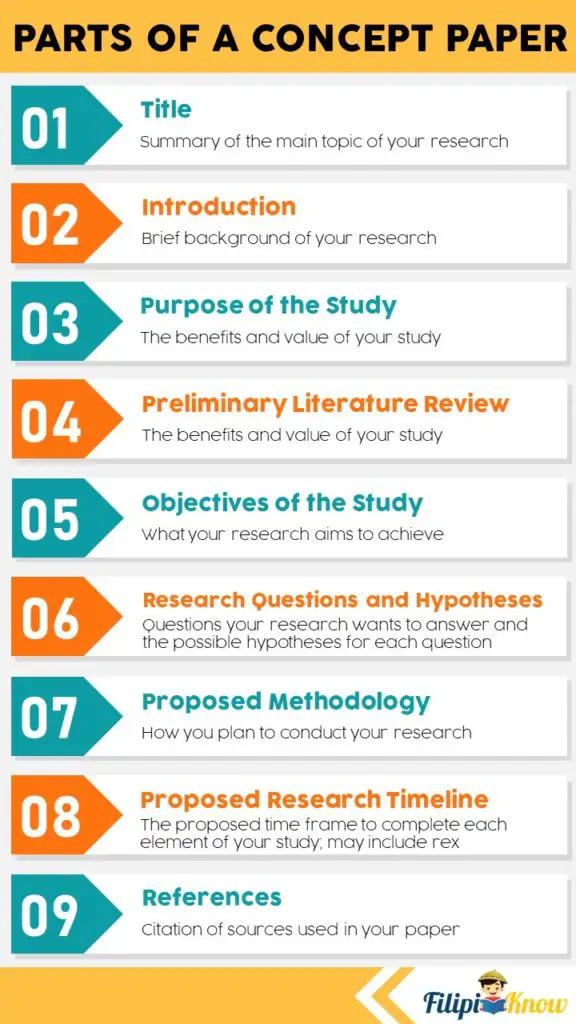
The title for your paper must be able to effectively summarize what your research is all about. Use simple words so that people who read the title of your research will know what it’s all about even without reading the entire paper.
The introduction should give the reader a brief background of the research topic and state the main objective that your project aims to achieve. This section should also include a short overview of the benefits of the research project to persuade the reader to acknowledge the need for the project.
The Purpose of the Study should be written in a way that convinces the reader of the need to address the existing problem or gap in knowledge that the research project aims to resolve. In this section, you have to go into more detail about the benefits and value of your project for the target audience/s.
This section features related studies and papers that will support your research topic. Use this section to analyze the results and methodologies of previous studies and address any gaps in knowledge or questions that your research project aims to answer. You may also use the data to assert the importance of conducting your research.
When choosing which papers and studies you should include in the Preliminary Literature Review, make sure to choose relevant and reliable sources. Reliable sources include academic journals, credible news outlets, government websites, and others. Also, take note of the authors for the papers as you will need to cite them in the References section.
Simply state the main objectives that your research is trying to achieve. The objectives should be able to indicate the direction of the study for both the reader and the researcher. As with other elements in the paper, the objectives should be specific and clearly defined.
Gather the research questions and equivalent research hypotheses you formulated in the earlier step and list them down in this section.
In this section, you should be able to guide the reader through the process of how you will conduct the research project. Make sure to state the purpose for each step of the process, as well as the type of data to be collected and the target population.
Depending on the nature of your research project, the length of the entire process can vary significantly. What’s important is that you are able to provide a reasonable and achievable timeline for your project.
Make sure the time you will allot for each component of your research won’t be too excessive or too insufficient so that the quality of your research won’t suffer.
Ensure that you will give credit to all the authors of the sources you used in your paper. Depending on your area of study or the instructions of your professor, you may need to use a certain style of citation.
There are three main citation styles: the American Psychological Association (APA), Modern Language Association (MLA), and the Chicago style.
The APA style is mostly used for papers related to education, psychology, and the sciences. The APA citation style usually follows this format:
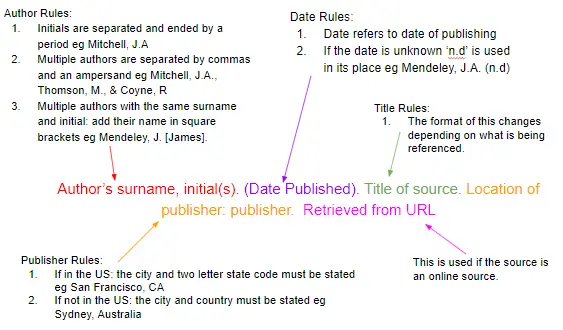
The MLA citation style is the format used by papers and manuscripts in disciplines related to the arts and humanities. The MLA citation style follows this format:
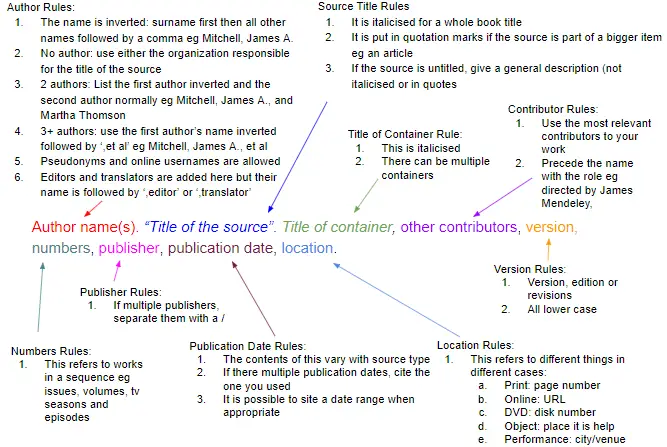
The Chicago citation style is usually used for papers related to business, history, and the fine arts. It follows this citation format:

This is a concept paper sample provided by Dr. Bernard Lango from the Jomo Kenyatta University of Agriculture and Technology (modified for use in this article). Simply click the link above the download the PDF file.
- Use simple, concise language. Minimize the use of flowery language and always try to use simple and easy-to-understand language. Too many technical or difficult words in your paper may alienate your readers and make your paper hard to read.
- Choose your sources wisely. When scouring the Internet for sources to use, you should always be wary and double-check the authenticity of your source. Doing this will increase the authenticity of your research project’s claims and ensure better data gathered during the process.
- Follow the specified format, if any. Make sure to follow any specified format when writing your concept paper. This is very important, especially if you’re writing your concept paper for class. Failure to follow the format will usually result in point deductions and delays because of multiple revisions needed.
- Proofread often. Make it a point to reread different sections of your concept paper after you write them. Another way you can do this is by taking a break for a few days and then coming back to proofread your writing. You may notice certain areas you’d like to revise or mistakes you’d like to fix. Make proofreading a habit to increase the quality of your paper.
Written by Ruth Raganit
in Career and Education , Juander How
Ruth Raganit
Ruth Raganit obtained her Bachelor of Science degree in Geology from the University of the Philippines – Diliman. Her love affair with Earth sciences began when she saw a pretty rock and wondered how it came to be. She also likes playing video games, doing digital art, and reading manga.
Browse all articles written by Ruth Raganit
Copyright Notice
All materials contained on this site are protected by the Republic of the Philippines copyright law and may not be reproduced, distributed, transmitted, displayed, published, or broadcast without the prior written permission of filipiknow.net or in the case of third party materials, the owner of that content. You may not alter or remove any trademark, copyright, or other notice from copies of the content. Be warned that we have already reported and helped terminate several websites and YouTube channels for blatantly stealing our content. If you wish to use filipiknow.net content for commercial purposes, such as for content syndication, etc., please contact us at legal(at)filipiknow(dot)net

How to Write a Concept Paper in 7 Steps
Before you can write a research paper, or begin your research, you may have to write a concept paper.
A concept paper is a short academic paper that explains the research you plan to conduct. It covers your research goals, how you’ll carry out the research, how you’ll collect data, and the questions you aim to answer through your research.
What is a concept paper?
A concept paper is typically a two- to three-page paper that concisely explains a proposed research project. If the paper is for a funding application, it may be twenty pages or longer.
In the paper, they demonstrate why their proposed project is worthwhile. The paper covers:
- Research goals
- Questions the research aims to answer
- The research methods the author will use
- The types of data that will be collected
A concept paper is also known as a research proposal. They may be submitted to investors to secure funding, or a student may submit one to their supervisor before starting a research project. Through reading a student’s concept paper, an academic supervisor can assess their project’s feasibility and, if necessary, suggest adjustments the student can make to improve their project so it’s more realistic or valuable. Similarly, prospective investors can decide whether a project is something they’d like to support. Undeveloped or unrealistic projects can end at the concept paper stage
7 steps for writing a concept paper
A concept paper’s title should directly express the paper’s content. Think of it as a preview for the reader. The title can be the question the proposed project aims to answer, or it can be a short statement that summarizes the paper.
2 Introduction outlining problem and gaps in knowledge
In the introduction section, provide an overview of your research project. This should include a short overview of the current state of your research area and existing gaps in this area. After explaining these, state which of these knowledge gaps you aim to fill with your research. This section should also mention any contradictory theories regarding the questions you aim to answer.
3 Mission statement
Your concept paper’s introduction should also include a mission statement . This is a sentence or two that concisely states your research purpose in an engaging way. Remember, the goal is to get your project approved—so your mission statement should communicate why the reader’s approval will benefit your field.
4 Research aim
Your concept paper also needs to address the reason why you’re conducting the specific research you’ve planned. This part, along with the following two sections, are sometimes grouped together as a concept paper’s project description.
In this section, cover the following:
- The reason why your research is important
- The questions you aim to answer through your research
5 Methodology
A concept paper also needs to discuss the methodology you plan to use while conducting your research. This is the strategy or strategies you will use to collect data, such as:
- Experiments
- Case studies
- Observations
This section should also include any ethical concerns that could arise during the research period.
6 Outline of proposed methods and potential impact
After describing your proposed methodology, write a section that discusses exactly how you’ll conduct your research using these methods. Be as specific as possible—if you plan to utilize resources like specialized equipment or collaborate with an expert in your field, include this information in this section. In this section, outline how long you expect the research to take and note the specific milestones you plan to hit during that time frame.
This section should also discuss your research’s potential impact. Discuss who your research and results will impact and how it will impact them. For example, you might conduct a study on undergraduate sleep schedules and publish a paper that supports campus-wide policy changes that promote healthy sleep cycles for students who live on campus.
A concept paper also needs to include a section that addresses the project’s budget. The section should explain the overall cost and break it down into individual expenses so readers can see exactly how the money will be spent.
Tips for writing a concept paper
Write to your audience.
A concept paper is a piece of academic writing, so use a professional tone . Avoid colloquialisms, slang, and other conversational language. Your concept paper should use the same tone and style as your accompanying research paper.
Write according to your reader’s familiarity with the subject of your concept paper. For example, if you’re proposing an IT project and your intended reader is the head of your university’s IT department, you can use technical jargon they will understand. If the intended reader is somebody in a non-technical role, avoid jargon and make sure you define every vocabulary word that might not be familiar to them. By ensuring your reader understands your concept paper, you increase the likelihood of them approving your project.
Use an engaging, accurate title
Just like a clear, intriguing subject line increases the likelihood of a recipient reading an email, an engaging title increases the likelihood of your reader not only reading your concept paper but understanding it. Choose a title that’s concise (fewer than 15 words or so) and accurately reflects your paper’s content. After reading your paper’s title, your reader should not be surprised by your proposed research.
Keep it to an appropriate length
If you’re a student writing a concept paper for an undergraduate, master’s, or doctoral project, two to three pages is generally the right length for your paper. Don’t worry about getting too detailed about the specifics of your research; a high-level overview is sufficient.
Concept papers meant to secure funding from investors can be longer than academic concept papers.
How is a concept paper different from a research paper?
The main difference between a concept paper and a research paper is when they’re written in relation to a research project. A concept paper is written before its author begins their research, and a research paper is written after they’ve completed it. In other words, a concept paper introduces readers to its author’s academic project, and a research paper explains the outcome of the project.
Concept paper FAQs
A concept paper is often a two- to three-page paper that concisely explains a proposed research project.
When do you need a concept paper?
You need a concept paper to outline a proposed research project. Often, they are part of undergraduate, graduate, and doctoral research proposals. It’s also common for entrepreneurs and individuals conducting scientific and public-service-related research to write concept papers to garner support for their work.
What are the main steps of writing a concept paper?
Write an engaging, accurate title
- Outline the problem you aim to solve
- Write a mission statement
- Explain your research aim
- Explain your research methodology
- Explain your research methods and the potential impact of your work
- Discuss your project’s budget and how it will be allocated
While a concept paper introduces a proposed research project by outlining its purpose, process, and goals, a research paper discusses a completed project in detail.
Source link
Copyrights © 2022 oxford-institute-education. All rights reserved
We noticed you're visiting from United Kingdom (UK). We've updated our prices to Pound sterling for your shopping convenience. Use United States (US) dollar instead. Dismiss
- More Networks
- Affiliate Program

- UNITED STATES
- 台灣 (TAIWAN)
- TÜRKIYE (TURKEY)
- Academic Editing Services
- - Research Paper
- - Journal Manuscript
- - Dissertation
- - College & University Assignments
- Admissions Editing Services
- - Application Essay
- - Personal Statement
- - Recommendation Letter
- - Cover Letter
- - CV/Resume
- Business Editing Services
- - Business Documents
- - Report & Brochure
- - Website & Blog
- Writer Editing Services
- - Script & Screenplay
- Our Editors
- Client Reviews
- Editing & Proofreading Prices
- Wordvice Points
- Partner Discount
- Plagiarism Checker
- APA Citation Generator
- MLA Citation Generator
- Chicago Citation Generator
- Vancouver Citation Generator
- - APA Style
- - MLA Style
- - Chicago Style
- - Vancouver Style
- Writing & Editing Guide
- Academic Resources
- Admissions Resources
Where to Put the Research Question in a Paper
Silke Haidekker has a PhD in Pharmacology from the University of Hannover. She is a Clinical Research Associate in multiple pharmaceutical companies in Germany and the USA. She now works as a full-time medical translator and writer in a small town in Georgia.
Of Rats and Panic Attacks: A Doctoral Student’s Tale
You would probably agree that the time spent writing your PhD dissertation or thesis is not only a time of taking pride or even joy in what you do, but also a time riddled with panic attacks of different varieties and lengths. When I worked on my PhD thesis in pharmacology in Germany many years back, I had my first panic attack as I first learned how to kill rats for my experiments with a very ugly tool called a guillotine! After that part of the procedure, I was to remove and mash their livers, spike them with Ciclosporin A (an immunosuppressive agent), and then present the metabolites by high-pressure liquid chromatography.
Many rats later, I had another serious panic attack. It occurred at the moment my doctoral adviser told me to write my first research paper on the Ciclosporin A metabolites I had detected in hundreds of slimy mashes of rat liver. Sadly, this second panic attack led to a third one that was caused by living in the pre-internet era, when it was not as easy to access information about how to write research papers .
How I got over writing my first research paper is now ancient history. But it was only years later, living in the USA and finally being immersed in the language of most scientific research papers, that my interest in the art of writing “good” research papers was sparked during conferences held by the American Medical Writers Association , as well as by getting involved in different writing programs and academic self-study courses.
How to State the Research Question in the Introduction Section
Good writing begins with clearly stating your research question (or hypothesis) in the Introduction section —the focal point on which your entire paper builds and unfolds in the subsequent Methods, Results, and Discussion sections . This research question or hypothesis that goes into the first section of your research manuscript, the Introduction, explains at least three major elements:
a) What is known or believed about the research topic?
B) what is still unknown (or problematic), c) what is the question or hypothesis of your investigation.
Some medical writers refer to this organizational structure of the Introduction as a “funnel shape” because it starts broadly, with the bigger picture, and then follows one scientifically logical step after the other until finally narrowing down the story to the focal point of your research at the end of the funnel.
Let’s now look in greater detail at a research question example and how you can logically embed it into the Introduction to make it a powerful focal point and ignite the reader’s interest about the importance of your research:
a) The Known
You should start by giving your reader a brief overview of knowledge or previous studies already performed in the context of your research topic.
The topic of one of my research papers was “investigating the value of diabetes as an independent predictor of death in people with end-stage renal disease (ESRD).” So in the Introduction, I first presented the basic knowledge that diabetes is the leading cause of end-stage renal disease (ESRD) and thus made the reader better understand our interest in this specific study population. I then presented previous studies already showing that diabetes indeed seems to represent an independent risk factor for death in the general population. However, very few studies had been performed in the ESRD population and those only yielded controversial results.
Example : “It seems well established that there is a link between diabetic nephropathy and hypertensive nephropathy and end-stage renal disease (ESRD) in Western countries. In 2014, 73% of patients in US hospitals had comorbid ESRD and type 2 diabetes (1, 2, 3)…”
b) The Unknown
In our example, this “controversy” flags the “unknown” or “problematic” and therefore provides strong reasons for why further research is justified. The unknown should be clearly stated or implied by using phrases such as “were controversial” (as in our example), “…has not been determined,” or “…is unclear.” By clearly stating what is “unknown,” you indicate that your research is new. This creates a smooth transition into your research question.
Example : “However, previous studies have failed to isolate diabetes as an independent factor, and thus much remains unknown about specific risk factors associated with both diabetes and ESRD .”
c) The Research Question (Hypothesis)
Your research question is the question that inevitably evolves from the deficits or problems revealed in the “Unknown” and clearly states the goal of your research. It is important to describe your research question in just one or two short sentences, but very precisely and including all variables studied, if applicable. A transition should be used to mark the transition from the unknown to the research question using one word such as “therefore” or “accordingly,” or short phrases like “for this reason” or “considering this lack of crucial information.”
In our example, we stated the research question as follows:
Example : “Therefore, the primary goal of our study was to perform a Kaplan-Meier survival study and to investigate, by means of the Cox proportional hazard model, the value of diabetes as an independent predictor of death in diabetic patients with ESRD.”
Note that the research question may include the experimental approach of the study used to answer the research question.
Another powerful way to introduce the research question is to state the research question as a hypothesis so that the reader can more easily anticipate the answer. In our case, the question could be put as follows:
Example : “To test the hypothesis that diabetes is an independent predictor of death in people with ESRD, we performed a Kaplan-Survival study and investigated the value of diabetes by means of the Cox proportional hazard model.”
Note that this sentence leads with an introductory clause that indicates the hypothesis itself, transitioning well into a synopsis of the approach in the second half of the sentence.
The generic framework of the Introduction can be modified to include, for example, two research questions instead of just one. In such a case, both questions must follow inevitably from the previous statements, meaning that the background information leading to the second question cannot be omitted. Otherwise, the Introduction will get confusing, with the reader not knowing where that question comes from.
Begin with your research purpose in mind
To conclude, here is my simple but most important advice for you as a researcher preparing to write a scientific paper (or just the Introduction of a research paper) for the first time: Think your research question through precisely before trying to write it down; have in mind the reasons for exactly why you wanted to do this specific research, what exactly you wanted to find out, and how (by which methods) you did your investigation. If you have the answers to these questions in mind (or even better, create a comprehensive outline ) before starting the paper, the actual writing process will be a piece of cake and you will finish it “like a rat up a drainpipe”! And hopefully with no panic attacks.
Wordvice Resources
Before submitting your master’s thesis or PhD dissertation to academic journals for publication, be sure to receive proofreading services (including research paper editing , manuscript editing , thesis editing , and dissertation editing ) to ensure that your research writing is error-free. Impress your journal editor and get into the academic journal of your choice.
We use cookies on this site to enhance your experience
By clicking any link on this page you are giving your consent for us to set cookies.
A link to reset your password has been sent to your email.
Back to login
We need additional information from you. Please complete your profile first before placing your order.
Thank you. payment completed., you will receive an email from us to confirm your registration, please click the link in the email to activate your account., there was error during payment, orcid profile found in public registry, download history, concept paper vs. research proposal – and when to use each.
- Charlesworth Author Services
- 08 March, 2022
Concept Paper vs. Research Proposal – and when to use each
On the surface, concept papers sound like they do the same job as a research proposal – and essentially, they do. Both are designed to communicate the rationale, methodology and outcomes of a proposed piece of work. The difference between the two lies mostly in the level of detail and the potential audience, based on which your approach towards writing each will vary. In this article, we dig deeper into these and recommend when to use which.
Concept paper: Putting your idea to paper
- What : A concept paper verbalises an idea and puts it to paper for the first time. Here, an overall rationale is presented, with a focus on the essential idea and potential impact of the expected outcome(s). However, what you would not include here is much in-depth detail.
- When : Writing a concept paper is most useful when an initial expression of interest is made to either a collaborator or funder – provided the funder has mechanisms for you to do this, like an open call.
- Why : The aim of your concept paper will be to win your audience over with your idea and its potential ramifications.
(For more on concept papers, read: Understanding and developing a concept paper )
Research proposal: Showing how things will get done
Let’s say that through your concept paper, you find funding and collaborators for your proposed research project. You will now get into the nitty gritty of the project with a research proposal, while still keeping it “consumable” enough for a broader audience.
- What : A research proposal builds on a concept paper by now including aspects like key deliverables, milestones and specific outcomes, as well as how you plan to achieve these.
- When : You will typically send a research proposal to sources of funding of an open nature, i.e. those that do not require a standardised form to be filled in, as is often the case with institutional internal funding or private investors.
- Why : It is not necessary for you to first send someone a concept paper and follow it up with a proposal. However, you may often need to follow this sequence in order to provide only ‘need to know’ material depending on the stage of your relationship with potential partners.
( For more on research proposals, read: Writing a successful research proposal )
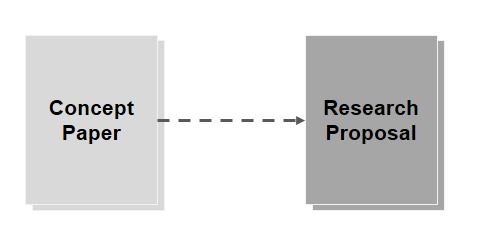
When both are needed, a concept paper precedes a research proposal
Deciding between a concept paper and a research proposal
Whether you send someone a concept paper or a research proposal depends entirely on two things:
- Your existing relationship with whomever you are reaching out to
- What you are trying to achieve
If you are emailing an organisation or individual for the first time, you are more likely to receive a response by attaching a brief, snappy concept paper that is easily read by a multitude of people. On the other hand, some larger organisations, such as pharmaceutical companies, are very used to seeing full-fledged research proposals and may have a portal on their website where you would need to upload one, enabling them to skip the preliminary step of vetting your work through a concept paper.
Our recommendation : Given how pressed many people are for time these days, it would be prudent to send concept papers more frequently than research proposals. If more information is required, you will be asked for it.
Concept papers and research proposals do very similar things, but set out and achieve very different aims. They are often sent in sequence – the concept paper first, followed by the research proposal. The need for a research proposal arises when the concept paper has achieved its mark – when, for example, more information is required for a funding decision to be reached, or due diligence is to be performed, as a result of your concept paper gaining preliminary acceptance. Following up with a research proposal fills in the gaps and will aid in answering questions arising from the concept paper.
Read previous (second) in series: Writing a successful Research Proposal
Maximise your publication success with Charlesworth Author Services.
Charlesworth Author Services, a trusted brand supporting the world’s leading academic publishers, institutions and authors since 1928.
To know more about our services, visit: Our Services
Share with your colleagues
Related articles.

Understanding and developing a Concept Paper
Charlesworth Author Services 15/12/2021 00:00:00

Writing a successful Research Proposal
Charlesworth Author Services 08/03/2022 00:00:00

Preparing and writing your PhD Research Proposal
Charlesworth Author Services 02/08/2021 00:00:00
Related webinars

Bitesize Webinar: Writing Competitive Grant Proposals: Module 1- Unpacking the Request for Proposals
Charlesworth Author Services 09/03/2021 00:00:00

Bitesize Webinar: Writing Competitive Grant Proposals: Module 2- Choosing the Right Funder

Bitesize Webinar: Writing Competitive Grant Proposals: Module 3- Structuring the Proposal

Bitesize Webinar: Writing Competitive Grant Proposals: Module 4- Developing a Grant Budget

The art and science of successful Grant Writing
Charlesworth Author Services 16/04/2020 00:00:00

How to write the Rationale for your research
Charlesworth Author Services 19/11/2021 00:00:00

Collaborating in research: Purpose and best practices
Charlesworth Author Services 24/02/2022 00:00:00
Voith and Essity receive funding from the German Federal Ministry for Economic Affairs and Climate Action to research a process for sustainable paper production
- In partnership with Essity, Voith is conducting research into a groundbreaking process for CO2-neutral paper manufacturing at its Heidenheim site.
- The facility will set new benchmarks for sustainable paper production and will reduce water consumption by up to 95 percent and energy consumption by up to 40 percent.
- Dr. Franziska Brantner, Parliamentary State Secretary at the Federal Ministry for Economic Affairs and Climate Action (BMWK), gave formal notice of funding in the amount of approximately €14.5 million.

Kristine Adams
Vice President Corporate Communications
t +49 7321 37 2228


IMAGES
VIDEO
COMMENTS
A concept paper primarily focuses on introducing the basic idea, intended research question, and the framework that will guide the research. Purpose of a Concept Paper. A concept paper serves as an initial document, commonly required by private organizations before a formal proposal submission.
A concept paper is a short document written by a researcher before starting their research project, with the purpose of explaining what the study is about, why it is important and the methods that will be used. The concept paper will include your proposed research title, a brief introduction to the subject, the aim of the study, the research ...
A concept paper is a piece of academic writing, so use a professional tone. Avoid colloquialisms, slang, and other conversational language. Your concept paper should use the same tone and style as your accompanying research paper. Write according to your reader's familiarity with the subject of your concept paper.
1. To explore and expand an idea: Researchers can use concept papers to transform an incipient research idea into a focused, high-quality study proposal. The paper is also a means to obtain feedback that can be used to strengthen a detailed proposal at a later stage. 2. To draw the interest of funding agencies: Through an effective concept ...
The first question asks for a ready-made solution, and is not focused or researchable. The second question is a clearer comparative question, but note that it may not be practically feasible. For a smaller research project or thesis, it could be narrowed down further to focus on the effectiveness of drunk driving laws in just one or two countries.
the answer the questions in the order shown here. Some concept papers begin with an introductory statement which provides a general statement as to what you are trying to accomplish. (This statement is distinct from the more specific research or project objective, included later.) A common format includes these headings: Need,
1. To explore and expand an idea: Researchers can use concept papers to transform an incipient research idea into a focused, high-quality study proposal. The paper is also a means to obtain ...
A concept paper is a brief paper that outlines the important components of a research or project before it is carried out. Its purpose is to offer an overview. Entrepreneurs working on a business idea or product, as well as students and researchers, frequently write concept papers. Researchers may be required to prepare a concept paper when ...
A concept paper is a brief paper written by a university student around a research question before undertaking the research. The paper is about two or three pages long and provides key details about the research, such as the question, purpose, and methods. The paper allows the supervisor to gauge how well the student understands the research ...
Typically, a concept paper contains the following elements: 1. A title which is usually in the form of a question. 2. A brief overview of the research topic, including a summary of what is already known about that topic. 3. A brief statement of the research question that the project will seek to answer.
A good research question is essential to guide your research paper, dissertation, or thesis. All research questions should be: Focused on a single problem or issue. Researchable using primary and/or secondary sources. Feasible to answer within the timeframe and practical constraints. Specific enough to answer thoroughly.
1. A title in the form of a question. This may be the last part ofthe concept paper that you write, but it should appear at the heading of the paper. 2. A clear description of the research topic, including a summary of what is already known about that topic. 3. A one-sentence statement of the research question that the project will seek to answer.
As the name suggests, these types of research questions seek to explore the relationships between variables. Here, an example could be something like "What is the relationship between X and Y" or "Does A have an impact on B". As you can see, these types of research questions are interested in understanding how constructs or variables ...
There are two types of research: Qualitative research and Quantitative research. There must be research questions for every type of research. Your research question will be based on the type of research you want to conduct and the type of data collection. The first step in designing research involves identifying a gap and creating a focused ...
Concept Paper vs. Research Proposal. Getting Started on Your Concept Paper. 1. Find a research topic you are interested in. Tips for finding your research topic. 2. Think of research questions that you want to answer in your project. 3. Formulate your research hypothesis.
follow these steps: 1. Concept paper title. Every pa per must have a title and concept paper is not left out as one needs to have a title that. summarizes what the paper is about. The title should ...
The title can be the question the proposed project aims to answer, or it can be a short statement that summarizes the paper. 2 ... How is a concept paper different from a research paper? While a concept paper introduces a proposed research project by outlining its purpose, process, and goals, a research paper discusses a completed project in ...
Empirical paper: Research question and hypothesis. The research question is the question you want to answer in an empirical research paper. Present your research question clearly and directly, with a minimum of discussion at this point. The rest of the paper will be taken up with discussing and investigating this question; here you just need to ...
Good writing begins with clearly stating your research question (or hypothesis) in the Introduction section —the focal point on which your entire paper builds and unfolds in the subsequent Methods, Results, and Discussion sections. This research question or hypothesis that goes into the first section of your research manuscript, the ...
A concept paper is a good first step in such proposal development. In any case, the point of a concept paper is to provide a clear summary of the research project. It should enable a casual reader to understand what the researcher is investigating, why it is important, and how the investigation will proceed. Revised 10/12/2005.
A research question is what a study aims to answer after data analysis and interpretation. The answer is written in length in the discussion section of the paper. Thus, the research question gives a preview of the different parts and variables of the study meant to address the problem posed in the research question.1 An excellent research ...
On the surface, concept papers sound like they do the same job as a research proposal - and essentially, they do. Both are designed to communicate the rationale, methodology and outcomes of a proposed piece of work. The difference between the two lies mostly in the level of detail and the potential audience, based on which your approach ...
Formulation of research question (RQ) is an essentiality before starting any research. It aims to explore an existing uncertainty in an area of concern and points to a need for deliberate investigation. It is, therefore, pertinent to formulate a good RQ. The present paper aims to discuss the process of formulation of RQ with stepwise approach.
AP Seminar and AP Research students to submit performance tasks as final and their presentations to be scored by their AP Seminar or AP Research teachers. AP Computer Science Principles students to submit their Create performance task as final. Late Testing . Occasionally, circumstances make it necessary for students to test late.
With the goal to driving the decarbonization of the paper industry with innovative solutions, Voith is working on a concept to enable CO2-neutral paper manufacturing. To drive forward the further development of this groundbreaking process, Voith has entered a partnership with Essity, a leading global hygiene and health company.
5.6.24. Junjie Guo, Kim Ruhl and Ananth Seshadri. In this fifth report in "The Economics of UW-Madison" white paper series we addresses the question: Is the Wisconsin taxpayer rather ungenerous in funding higher education?